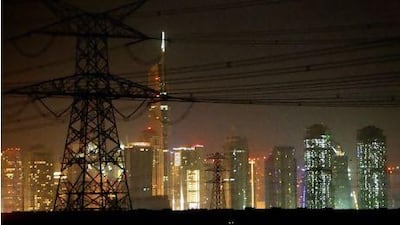Dubai residents paid almost Dh2 billion more on their water and electricity bills in the first half of the year, compared with the same period last year.
Dubai Electricity and Water Authority (Dewa) recorded a 42 per cent jump in revenue after pushing through its first tariff increase in years.
The state utility took in Dh6.6bn (US$1.79bn) in revenues during the first half of the year as its income rose by 9 per cent to Dh1.63bn, according to a filing yesterday to the Nasdaq Dubai. It raised power and water prices by 15 per cent in January.
But the earnings boost comes before a particularly tricky time for the state utility as it tries to balance big-budget projects with a promise to freeze power and water prices.
Last week the Supreme Council of Energy, the emirate's policymaking body, said utility tariffs would remain fixed for the next few years.
"It's structured professionally in a business way, supporting the economy," Waleed Salman, a member of the council, said yesterday. "We're not going to introduce a new tariff every six months or every year."
At the same time, the utility is working on a $1.5bn power and water plant called Hassyan that is to be its first private venture. Dewa also plans to introduce ultra-modern clean coal and solar power to its energy mix.
The tariff freeze will not jeopardise those projects, said Mr Salman, who is also Dewa's vice president of strategy and business development.
"It's a government entity, but we operate on a commercial basis," he said yesterday. "We don't want to put a burden on the Government."
Dewa's campaign for consumers to cut power and water use could make the situation more precarious, said Robert Bryniak, the chief executive of the regional utilities consultancy Golden Sands.
"It's going to make it a real challenge for them financially for them to pursue conservation aggressively," he said. "As they pursue conservation their revenues are going to decline … They're going to have to have a real strategy in conservation."
Last night, Mr Salman was preparing to travel to South Korea and Japan today to drum up interest in financing Hassyan near the Abu Dhabi border, which will have 1.500 megawatts of capacity.
Japan's Mistubishi, General Electric of the US and Total and GDF Suez of France have all emerged as possible contenders for the project scheduled to be tendered in mid-October, according to Mr Salman. Abu Dhabi National Energy, the company majority owned by the Government that pioneered the privatisation of the emirate's power and water assets in 1998, has also shown interest.

